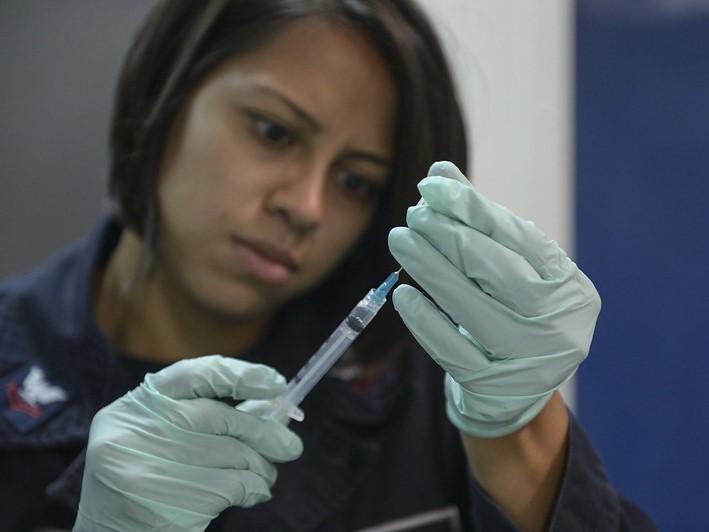The threat to Americans' access to lifesaving vaccines has arrived.
In the past, vaccine use recommendations from the Centers for Disease Control and Prevention (CDC), while not always free from criticism, were based on a thorough, public review of relevant evidence as part of the "evidence to recommendation framework." The recommendations serve as guidance—to the frontlines of healthcare, to state-based immunization programs, and to the American public. Any resulting "mandates" are dictated by the states, not the federal government. Federal vaccine recommendations also provide guidance about insurance coverage for vaccines.
Without that endorsement, insurers may choose to drop a vaccine in their scope of benefits, thereby limiting a patient's choice by eliminating affordable and convenient access.
A departure from practice and prudence
On May 27, flanked by the leaders of the Food and Drug Administration (FDA) and National Institutes of Health (NIH), Health and Human Services (HHS) Secretary Robert F. Kennedy Jr. announced in a 58-second video posted to X that the COVID vaccine had been removed from the CDC's recommended immunization schedule for healthy children and pregnant women. One headline splashed, "CDC removes COVID vaccine recommendation for healthy children and pregnant women." In reality, the secretary took this unilateral action without CDC leadership present, without CDC advisory engagement, and without informing the CDC in advance.
None of the evidence that went into Secretary Kennedy's recommendations was either presented or available—contrary to HHS's slogans of "radical transparency" and "gold standard science," and in contrast to the open, public process that has been used to date, which allowed everyone to see how recommendations were developed.
Announcing such a consequential shift in public health policy via social media abandoned the deliberative, evidence-based process to determine vaccine use that healthcare providers, insurers, state health departments, and, most important, the American people expect and deserve: an intentional process specifically designed to build trust.
None of the evidence that went into Secretary Kennedy's recommendations was either presented or available—contrary to HHS's slogans of 'radical transparency' and 'gold standard science.'
Indeed, the CDC's Advisory Committee on Immunization Practices (ACIP) is scheduled to meet in a month to make recommendations on the very question of who should get a COVID vaccine. They had previously hinted their intent to review the evidence on whether to recommend routine boosters in healthy children at the upcoming meeting, where they would share the data and, with opportunity for input from the public, have experts publicly deliberate the important questions at hand. The ACIP discussion would have focused on the facts about COVID vaccines—what the science says about who may benefit and who may be harmed—and whether the vaccine is cost effective.
The American people instead got an announcement video less than a minute long. This action raises the concern that it could be how vaccine policy—and other health policies and recommendations—will be made going forward. This is a precedent sure to undermine the public's trust. And undermining the public's trust in vaccines has been Kennedy's professional goal for nearly a decade.
In response, professional societies that many patients and physicians turn to for independent guidance—the American College of Obstetricians and Gynecologists (ACOG), American Academy of Pediatrics (AAP), American Academy of Family Physicians (AAFP), and Infectious Diseases Society of America (IDSA)—issued statements criticizing both the process and the content of the new recommendations.
Filling the information void
The announcement spurred confusion. The previous week, in the New England Journal of Medicine, FDA Commissioner Marty Makary told Americans something different. In that May 20, 2025 article (see Figure 2 in that article), and in a subsequent public discussion on YouTube, Makary reassured the public that pregnant women—who face substantially higher risks of severe illness, hospitalization, and even death from COVID-19—would still have access to vaccination.
He pledged that the vaccine would be available to people who have health conditions that make them vulnerable to severe disease related to COVID infection. Pregnancy is on that list of conditions that he provided.
In a Face the Nation appearance after Kennedy's announcement, Makary said that women need to consult with their providers, but he didn't indicate what evidence should inform the discussion. If HHS has new information, it should make it public.
With the dynamics of the SARS-CoV-2 virus (its mutating variants, changes in disease severity, and virus transmissibility) and the recent appearance of a new variant (NB.1.8.1B) that the World Health Organization believes may be affecting disease patterns around the world, a public discussion of the data is more important than ever.
If HHS has new information, it should make it public.
And it needs to happen soon, well in advance of respiratory virus season. ACIP should lay out the data at its next meeting—currently scheduled for June 25 through 27—and provide its recommendations to help inform the very clinicians and patients charged with decision making, even if it's after the fact of Kennedy's unprecedented actions.
If that doesn't happen, it demands a response, with input from the frontlines of our healthcare system and public health. There must be an open, public discussion about the evidence supporting COVID vaccine recommendations. The American people deserve that. They deserve to see the work. It's vital for public confidence.
The best and most durable public health decisions, including about vaccine use, are made in plain sight, in consultation with independent medical professionals, and are backed by rigorous review of current data. The events of the past few weeks raise serious doubts about whether we can count on the US government to follow that common sense blueprint.
The Vaccine Integrity Project, together with our medical, public health, and community partners, is preparing to fill that void.
Vaccine Integrity Project Viewpoints are authored by project staff and advisers. They are intended to address timely issues regarding vaccines with straight talk and clarity by presenting facts to counter falsehoods.




















